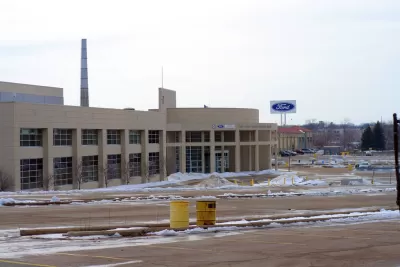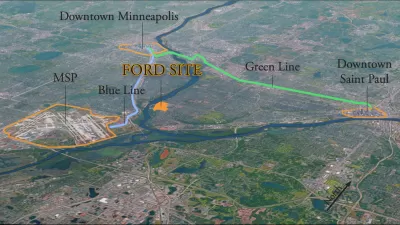Plans for a sizable eco-friendly development on the site of St. Paul's Twin Cities Assembly Plant have drawn support from many, including the city's young mayor. But density opponents remain unconvinced.

Jay Walljasper gives us an update on redevelopment plans for the site of Ford's former Twin Cities Assembly Plant in St. Paul, Minnesota. "Over the next 20 years, these 122 acres overlooking the Mississippi River are slated to grow into a dense mixed-use neighborhood designed to be a showpiece of energy efficiency, smart design, ecological stormwater management, and enlightened economic development."
Urbanists should find a lot to like in the the plan, which calls for "a transit-accessible community for up to 7,200 residents, an eco-village within the city that boasts a grid of bike- and pedestrian-friendly streets, abundant green space, and jobs for 1,500 workers [...] Twenty percent of the development's housing will be priced for lower-income residents."
It will also pursue net-zero status, an ambitious goal given Minnesota's harsh winters. The site's former use notwithstanding, it will also be "optimized for car-free and car-lite lifestyles," with ample bike lanes and a woonerf-style roadway.
However, opposition to the project continues as neighborhood groups take issue with the development's density. Walljasper notes that the debate follows generational lines, with younger voices like that of St. Paul's 39-year-old mayor Melvin Carter supporting the project.
FULL STORY: How an Ambitious Minnesota Eco-Project Became a Density Battleground

Planetizen Federal Action Tracker
A weekly monitor of how Trump’s orders and actions are impacting planners and planning in America.

Map: Where Senate Republicans Want to Sell Your Public Lands
For public land advocates, the Senate Republicans’ proposal to sell millions of acres of public land in the West is “the biggest fight of their careers.”

Restaurant Patios Were a Pandemic Win — Why Were They so Hard to Keep?
Social distancing requirements and changes in travel patterns prompted cities to pilot new uses for street and sidewalk space. Then it got complicated.

Platform Pilsner: Vancouver Transit Agency Releases... a Beer?
TransLink will receive a portion of every sale of the four-pack.

Toronto Weighs Cheaper Transit, Parking Hikes for Major Events
Special event rates would take effect during large festivals, sports games and concerts to ‘discourage driving, manage congestion and free up space for transit.”

Berlin to Consider Car-Free Zone Larger Than Manhattan
The area bound by the 22-mile Ringbahn would still allow 12 uses of a private automobile per year per person, and several other exemptions.
Urban Design for Planners 1: Software Tools
This six-course series explores essential urban design concepts using open source software and equips planners with the tools they need to participate fully in the urban design process.
Planning for Universal Design
Learn the tools for implementing Universal Design in planning regulations.
Heyer Gruel & Associates PA
JM Goldson LLC
Custer County Colorado
City of Camden Redevelopment Agency
City of Astoria
Transportation Research & Education Center (TREC) at Portland State University
Camden Redevelopment Agency
City of Claremont
Municipality of Princeton (NJ)




























